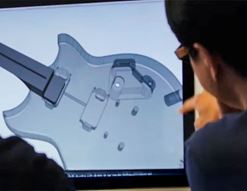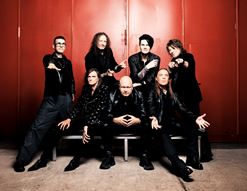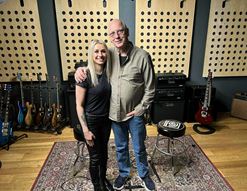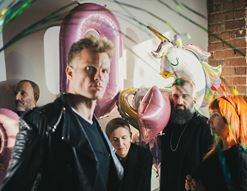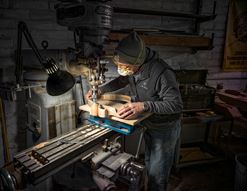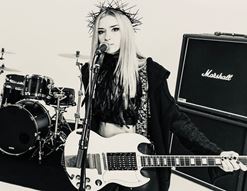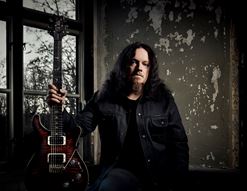There’s no one out there quite like Devin Townsend. The prog metal maestro has, over a 30+ year career, dazzled us with albums that are as multifaceted as they are ambitious; as intimate as they are gargantuan. By now, he’s firmly established as an icon in the world of progressive heavy music, and even though he most definitely has a ‘sound’, we’re also never quite sure what we’ll get from him next.
His latest record, Lightwork, is his first since the global pandemic, and is also the first time he has chosen to work with an outside producer. Garth ‘gggarth’ Richardson is one of the most celebrated rock producers on the planet, having worked with everyone from Rage Against the Machine to The Melvins and Biffy Clyro. This marks a huge departure for Townsend, who is a producer himself, in addition to his myriad other talents.
At guitarguitar, we’ve been lucky enough to enjoy a long-term relationship with Devin, starting with an instore in Glasgow away back in 2011 (as his Deconstruction record was about to be released), and then in various subsequent places, including his tour bus, an Edinburgh venue and his home studio. This time, we managed to snag some time with him whilst he was on tour, joining him on Zoom just before his last night of a 7 week jaunt to support Lightwork.
As usual, Devin’s cheerful, amiable tone was streaked through with honesty and a keen sense of self-awareness. Always seeking to communicate and share, the conversation we had (transcribed in full below) is one of the most fascinating and revelatory that we’ve participated in. In it, you’ll learn all about the tricky, conflicted construction of Lightwork, a record whose joyful bliss belies a stressful and difficult birthing process. We’ll chat in depth about guitar tones, mental health and the power of advocating for yourself. Enjoy!
Lightwork: Writing, Production, Process, Conflict
guitarguitar: Last time we spoke, it was the middle of the pandemic and you were in your studio in Canada. You were talking to me about making ‘alien pop’ music. Since then, Lightwork has come out: did any of that alien pop music make it into the final record?
Devin Townsend: Not really! The intent of Lightwork was, in a lot of ways, to be the antithesis of what I did with Puzzle, so it was very linear. It was an opportunity for me to experiment working with a producer, which was something I always wanted to do to see what would happen. It was a lot more linear than most anything that I’ve done, and I really liked it for that. But that alien pop music has migrated (laughs) as these ideas tend to do, into the next few projects. There will be a certain amount of that even on The Moth, which is the musical I’ve been working on.
I think that it’s less about the sound of the music and more about the process of actualising it that has that sort of alien - for lack of a better term - aesthetic. But in terms of ways to achieve that, I’m really excited about it. Today’s the last gig, so I can go home and start picking away at it again.
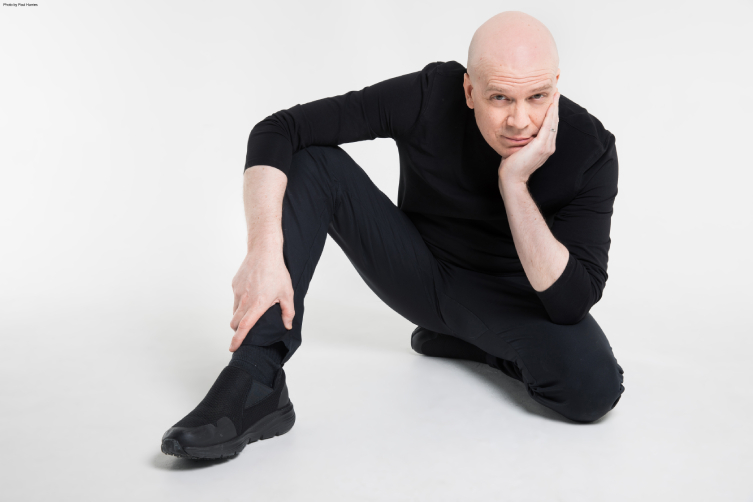
(Photo: Paul Harries)
GG: Nice! Staying with Lightwork, I remember reading in your book Only Half There that for you, quite a lot of the album-making process was like an opportunity to deconstruct certain thought processes. I wondered, was that the case this time with Lightwork? And if so, which processes needed working on?
DT: Conflict, I think. The opportunity to do that record put me in a position where I had a committee of people for the first time - many of whom I was not familiar with prior to the process - that all had seemingly a say in the work. Having never had to do that - and also consciously asking for that - was a scenario that ended in, not conflict in a necessarily negative way, but anything I’ve done in the past has been more jamming with people, like: ‘We’re gonna run with this, we’re not gonna run with this’, but y’know, I’ve been very rarely told ‘no’ (laughs) and in order to actualise that record in a way that I was comfortable with, whilst still being able to adhere to the work that had been done on it, required me to say ‘no’ myself.
So the foundation of Lightwork was about ‘how do I stop being a people-pleaser?’ in a sense. I think that, if there’s anything that I’ll take away from that - and be thankful to Garth and everyone who was involved with that - was that it was something that was inevitable. If I want to progress, I needed to get by that. I mean, obviously, it wasn’t an intentional thing, like ‘let’s make a record about that and focus on that’; it was just the process that I asked to be involved with, of working with a team, yielded a lot of conflict, and I needed to say ‘no’ to the aspects of it that I was uncomfortable with.
"The success of the record for me is that the intent is still positive, through a sea of chaos"
That, a lot of times, was in opposition to what the others thought was the right thing, so I had to say, ‘look, at the end of it, it’s mine. It doesn’t bother me what you think or what you think, this is what I’m comfortable with and this is what I’m uncomfortable with’.
So, it put me in a position where I felt the need to take control of it back, which was very difficult for everybody involved. I think that the silver lining for this is that I recognised that the process of doing what it is that’s right for me feels a certain way, and since that time, I’ve got that as part of my skillset, right? It was a very important step for me. The success of the record for me is that the intent is still positive, through a sea of chaos. And it wasn’t just the recording: obviously, it was the tail end of the pandemic; I moved house and renovated it, so every aspect of my life at that point was fraught with ‘you have to stand up for yourself’, I guess, on some level.
I’m very grateful for it, as a result. That’s something I needed to learn, right?
GG: Yeah, definitely. That’s interesting: one of the things I was going to ask you about you’ve kind of answered, but I’d like to dive in a bit, if that’s ok?
DT: Sure.
GG: You’ve talked about taking charge, and standing up to protect what was ultimately your thing. But also, there’s that decision of handing over your reins to another producer, Garth. On top of that, you are your own producer and you’ve produced for other people. So, my original question was going to be ‘how do you like being produced?’, and I suppose that still stands, but on top of that, was part of the notion of standing up for yourself the statement of ‘I need someone else to dictate this and that?’
DT: I think it’s a delicate thing because it’s absurd for me to ask somebody to do something and then say ‘no’ to it and claim that as being some sort of heroic movement. It’s more that I wondered what would happen if I did it, and by doing it, I realised that the process that many producers work within, is something that really fundamentally doesn’t work for me. And you don’t know until you know. So, a big part of it for me was also feeling guilt, I guess, about sort of taking the reins back from people, when I had given it to them in the first place.
GG: I see.
DT: And the consequent confusion that that brings to them, right?
GG: Sure.
DT: But again, a big part of it for me was saying, ‘Well, that’s just how it is, man’. You know, not everybody’s gonna like you. And I think when you’ve spent a lot of your time with your processes being about subconsciously pleasing people, then that’s a hard pill to swallow. If all of a sudden you realise three quarters of the way through this that ‘I’m not comfortable with this and I need to change’, and everybody being like ‘what the fuck?’, me at that point has to accept that what-the-fuckness! You can apologise up and down but at the end of the day, it’s just a decision that needed to be made for me to be comfortable with the work. And that was very difficult, man! Very difficult. These people are my friends, and you know, you definitely confuse people and hurt people, but the music and what it is that I feel my work and career has represented over the past 30-some odd years, has a trajectory to it. To fundamentally change, at this stage, I recognise, at the 11th hour, was something I was not willing to do. And that was a very, very negative thing for everybody.
"A lot of how I participate in the joy of music is in the unrestrained aspect of it. Even if the outcome is ultimately a restrained thing, the process was without borders"
But again, the success of the record was that the intent remain positive through that, you know? The lyrics, the whole idea with the lighthouse…I kept thinking that in some of the darker moments that: it’s not me, it’s not other people, it’s the creative catalyst that brings forth music that is the light in that lighthouse. So, if I keep myself focussed on that, beyond any of the dramas, then I could find a way through that. That’s what that record represents to me. As a result of that, it’s a pivotal record for me, in a lot of ways. Maybe not musically in the ways that people say, like, Empath was very idiosyncratic and really over the top, whereas Lightwork is certainly not that. It’s much more one colour but the process of actualising it was so extreme in the realm of my lineage of making records that I think there will be a ‘before’ and ‘after’ it as a result. For that, I’m super grateful, man. Like, super grateful.
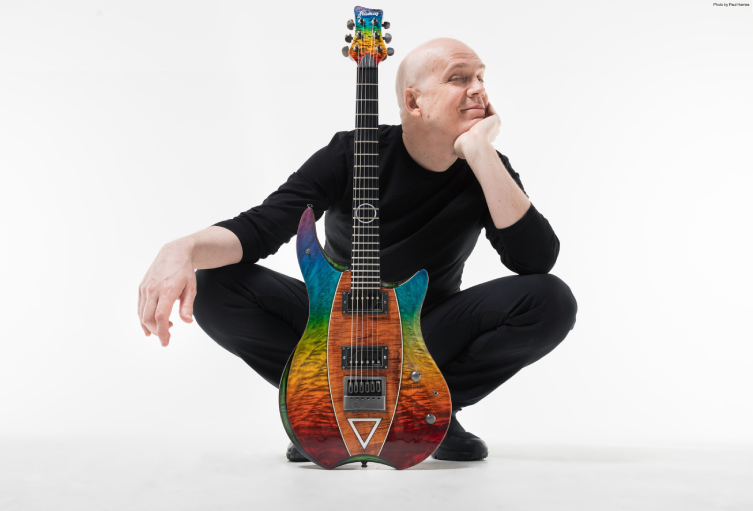
(Photo: Paul Harries)
GG: Wow, okay! You touched on some bits that I wouldn’t mind going further into again. With Lightwork, it’s a beautiful sounding record and there are obviously still the hallmarks of a Devin Townsend record: we hear the brilliant, operatic vocals, and we hear the dynamics and so on, but there is a different feel to it. I wondered, given what you’ve just said, about the lyrical content, and about keeping that positive tone intact. Let’s take for example Moonpeople: who soon into the process would you introduce lyrics, and how would they evolve into the finished song?
DT: Well a lot of this one - and profound credit where credit is due - Garth Richardson is a world-renowned producer and a fantastically talented cat. Much of the first three quarters of this record was his influence. Structurally, in terms of going through the lyrics and listening to what I’m saying then saying ‘yes’ or ‘no’ to things. It’s a really cool effect to take that kind of thing that I do and then put it through the filter of somebody who’s had a 50 year career of refining peoples’ vision into more palatable chunks.
So, I diligently participated in that process until everything was just too much and I was like ‘I can’t do this anymore, man’. But up to that point, Garth had so much influence over Lightwork, and I think a lot of what he did is fucking fantastic. The things that were more just like ‘me’ were like Heartbreaker, Heavy Burden and the end of Children of God, but much of the rest of it, structurally, was a push and pull between Garth and I. He had some very distinct ideas as to what the music should be doing, and I think it’s just maybe that it was less about the ideas and I’m just a contrarian, like I always have been, right? As soon as somebody says ‘do this’, I tend to do the opposite, so it was difficult for me in that way because our approaches are so different too.
But Moonpeople, Call of the Void, all these things, and the smooth flow of those arrangements are where Garth’s brilliance lies. He’s taken a lot of bands like Biffy Clyro or Shihad and he’s made their most impactful record because he was able to massage their vision into something that isn’t as off-putting to a more wide audience. So there’s a lot of that on Lightwork, and I’m super grateful. But just towards the end, man, I moved house and it was so fucking stressful! It was so fuckin’ stressful dude, and it was renovating and all this shit, and at the end it was like ‘you have to do it this way’ and I was like ‘no man, I can’t do it like this anymore!’ I gotta take this and make it into something where, when I listen to it, I don’t hear the intent of trying to achieve a wider audience. What I needed to hear with this was ‘this is my next record’ and this whole aspect of it was a huge part of it.
GG: Okay.
DT: Like, Garth and his team, his significant other. I mean, I love these people, right? But, by the end of it, I was feeling like I don’t want to be more popular, in a weird way, you know? A lot of times, people could interpret that - and do interpret that - as fear. Like, you have a fear of success. I dunno man, it just seems like fame is a scourge for all the things that I ultimately want to do, which is be creatively free with a bunch of empathetic people, making weird-ass music, right? (laughs)
It was a very challenging process, and not just because of the production but because of the circumstances surrounding it all. I had a certain threshold and once it was reached, I was like, ‘No, I gotta finish this a different way’.
GG: You mentioned just a second ago about being somewhat of a contrarian. Could it be that Garth was doing such a good job in his specific way that there was a part of you that said, ‘I want to see what happens if I take that other road’?
DT: Yeah! Totally. And I think that’s maybe what his frustration is. Like, ‘man, we could’ve made this amazing thing, and you just took it in another direction’. But I also feel that it was amazing for other people but it wasn’t necessarily amazing for me. And I made the music for me: I just do. It has to be…in order for me to feel comfortable with the music, it has to be like an audio diary. ‘This is what I did in Summer camp’, essentially. The intent of it being a brilliant thing for somebody else in their mind, mixed by somebody else: I heard certain aspects of how it was manifesting and yeah, maybe I was uncomfortable with it because it was too good, or maybe it just wasn’t good enough. So, who knows, man? I guess I didn’t have the mental resilience, with all of the things going on, to take that risk.
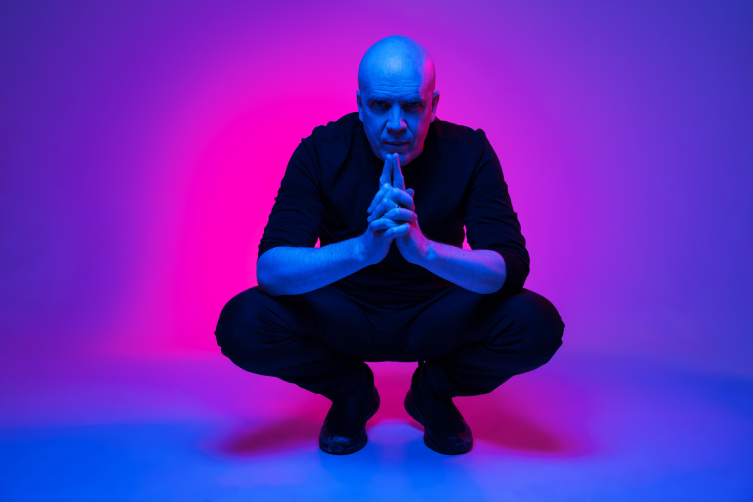
(Photo: Paul Harries)
GG: Yeah, That’s a subject I’d like to come back to in a wee second. I want to use the word ‘restraint’ with Lightwork, but I don’t mean it in the way that Ki was about restraint in an entirely different way because Lightwork is still full of tapestries of sound but I’m thinking more about the approach of certain sections as they come and go. It seems like there could be a mad drum fill there, but there isn’t one; there could be an enormous guitar but there isn’t one. Would you say that there’s a sense of restraint that’s been sculpted into it that allows the record some more space?
DT: Yeah, a lot of that was Garth, too. He was very ‘yes’ and ‘no’ about things, and man, that’s a hard one for me! A lot of how I participate in the joy of music is in the unrestrained aspect of it. Even if the outcome is ultimately a restrained thing, like Ki, the process was without borders. I think what I really needed to come away from this was that I needed to know that this doesn’t work for me.
GG: Yeah.
DT: But again, it’s important for me to make it clear that it doesn’t make it right or wrong. It doesn’t make somebody else’s ideas better or worse than mine. I just really began to dislike the direction that it was going. And maybe that’s just because of my own fear: I’m happy to accept that, that that’s how it is!
Emerging Visions
GG: Sure! And with that, whenever you’re doing any new record - obviously Lightwork is the newest release - do you ever feel like you have to contend with any kind of burden of expectation of the previous work that you’ve done - other people’s expectations or your own - versus the freedom to create what you want to create?
DT: The only expectation that I feel beholden to is that it was of emotional authenticity, and I think that was what I was having problems with towards the end of Lightwork. Yes, it was really great, in a way. Yes, if we had a big name producer mixing it instead of mine it would’ve, you know, all that orchestration stuff might’ve been sculpted differently, but it wasn’t where I was at, dude, you know?
GG: Uh-huh.
DT: A lot of times, during the process of making these records, I don’t know where I’m at - and I’ve said this on numerous occasions - until the tail end of the process. I don’t know what it is until I’m almost done. I remember practical examples of that. Making Alien by Strapping Young Lad, and at the very end, the last month, I was like ‘Oh my god, what have I made here? This is a fuckin’ horrorshow!’ (laughs) And then I had to contend with the emotional ramifications of the decisions I’d made leading up to that point where I could then be okay with it. That yielded two years of chaos in my head because at the end, I recognised that the statement I’d made was one that didn’t have the same level of accountability that I thought was important to the work. Therefore, to just put it out to the world, I was gonna have to deal with the repercussions of that, and that’s what happened.
GG: Sure.
DT: Empath: I had no idea what it was until the end. In the last month, I was able to say, ‘Oh what’s subconsciously happening here is that I’m taking stock of where I’ve been before I cross this bridge. So, you’ve got the symphonic aspect of it, you ‘ve got the heavy aspect of it, you’ve got the whimsical aspect of it, but it’s all compartmentalised so I could look at it and as a result of that, at the end of it I was able to say, ‘Okay, well the colour of Empath is like a spectrum’. And then I could finish the artwork, because I was able to see it. But I’m never able to see what it is until it starts to come into view.
GG: Ahhh!
DT: At the end of Lightwork, I was thinking: oh I’m making a statement that has a lot to do with somebody else. I think that any good producer becomes very invested in a work, and at that point there comes a hard line: ‘no, we don’t do this’, ‘this is how it has to finish’. When it started coming into view, I was like, I don’t think this period of my life is about that. This period of my life is about moving, and about this process and the confusion of it all, and trying to keep my shit together in a fundamentally chaotic time. That’s what it’s about, it’s not about creating a commercial record. It’s not about writing something that a bunch of people that are not a part of the fanbase - yet - are being serviced by. It’s not that, and I didn’t know until the end.
All of a sudden I was like, ‘Aw, fuck! Damage control! (laughs) I gotta make this something I can get behind emotionally with all of these things that I’ve now identified. So now I have to take it and do it myself. We tried to mix it with some other people and I fuckin’ hated it dude! I hated it. But the overwhelming thought was ‘you are not capable of mixing this’. I was like, ‘I am, man! I’m sorry, but I’m gonna take it and do it myself’.
GG: Excellent.
Taking Hold of the Mix
DT: And at the end, what I ended up accomplishing with it, I was probably the only person in the team that was happy with it. Everybody else was like ‘It could have been this. It could have been this!’ But it took me the entire year to recognise that that wasn’t what it was about for me. Lightwork was about hanging on to the creative impulse through rocky seas, so that I could create something with emotional authenticity that represented where I was at, where my family was at, where I was emotionally moving. I don’t want to make a record that lots of people like, and it’s like, ‘well, that’s fear. You’ll be able to make a lot of money if you do that’. What you sacrifice for that is not worth it for me.
So, when I finished Lightwork in a way that I thought was appropriate - much to the chagrin of basically everybody else involved - I remember thinking: ‘Okay, they don’t like it in the way of ‘it coulda been great’, but I fuckin’ like it. This is something that I can now get behind’. So when I listen to it from beginning to end, I can deal with that. It’s emotionally in line with where I found myself at the end of the process. Everybody else, like the producers, are like ‘next record, next record’. By the end of the record, they’re like ‘this is done, let’s finish it this way’, and I’m like ‘well, this is not right for me, man.’ ‘Okay, and you’re telling me this now?’ (laughs) Like, I didn’t know, prior, you know what I mean?

(Photo: Paul Harries)
GG: Yeah, yeah!
DT: But again, the real hard part is that I don’t blame anybody for their reaction to that. I mean of course it’s gonna come across as irrational or petulant or whatever, but I don’t know till I know, dude. And one of the other things that I didn’t know till I knew is that that’s not for me, and I needed to know that. Everybody in the world can tell you that something you’re doing is fantastic, but if you don’t think it’s right - for whatever reason - psychologically, your thoughts of why it isn’t right, is. You know?
GG: Exactly.
DT: Whether people want to interpret that as fear, or in my case as it’s just not fuckin’ right (laughs) and I didn’t know! Whatever it is, that’s the emotional authenticity that I need to have in line with whatever came before, in order for me to handle it. And that’s, y’know, a super-long answer to your question! But the things that make the records work for me at the end is when I sit back and listen to them and I’m like, ‘that’s where I’m at’.
GG: That takes such a lot of courage, and balls, to be able to face that.
DT: Fuck yeah, dude! Fuck yeah, especially when there’s people you care about and they’re like ‘You asshole!’
GG: Yeah.
DT: You know? And I’m like, ‘Sorry man!’ Fuck dude! So Lightwork was super important as a record to me, because through all that, I was like ‘Keep it positive. Keep the intent of it’. Because it’s nobody’s fault, everybody did the best job they could possibly do. Garth and his team put so much effort into that work, so much effort, and the disappointment at the end when I all of a sudden was like, ‘no’, they were like (shocked face) ‘Dude!’ You know? Man, I wish I had the capacity through the emotions, to articulate why I had to do this, but when everybody’s heated, you’re arguing, right? And in those moments, the only thing I could do was say: ‘No, man. I gotta do this this way cos for whatever reasons other people may think, I have to have this a certain way’. And I think that, obviously Garth is a good friend and a brilliant producer but there’s engineers, and the label and management, and people saying ‘just let go of it and let it be. The reason you can’t let go is because you’re afraid’, whatever right?
GG: Sure.
DT: I don’t know about that, though, man! I don’t think I like it! And that’s as valid a reason to do what I did…
GG: Yeah, yeah!
"I dunno man, it just feels like fame is a scourge for all the things I ultimately want to do, which is be creatively free with a bunch of empathetic people, making weird-ass music, right?"
DT: So, yeah man, it was a super-heavy experience and one that I’m very grateful for. Making sure that every time I turned on the computer to mix it, with a whole lot of people pretty convinced that I wasn’t able to mix it, which made the mix process really fuckin’ hard. I had people saying ‘You’re not going to be able to do this, you’re not going to be able to do this’, and I’m like, holy shit dude! Just let me do it!
So, while I was mixing it, I remember thinking - and it sounds like I’m trying to come across as some sort of martyr here, and it wasn’t that, because I chose to do something in opposition to what I’d asked people to do in the beginning so that part of it is certainly on me - but during that process when I was mixing it, I wanted the material coming out of the speakers to be that of hope. I kept modifying the lyrics, so that any trace of ‘I’ve been done wrong’ or ‘I’m sorry’ - any of that shit - was outta there, because that’s also not what this was about! What this is about is hanging on to that creative catalyst that’s been that thing that drives your work for 30 years through a period in which it seems easiest to just say ‘Okay I give up’, and let them do whatever they want with it.
When it’s Time to Change
GG: Yeah, so you were still working on your vocals that far into the process?
DT: Yeah because again, Garth is brilliant but his production style is like…in the 80s and 90s there were a lot of producers like Bob Rock that employed a certain thing where you would repeat phrases a lot of the time. Like, the chorus is the same every time because it gives the audience a psychological whatever it is, right? But there were certain periods towards the end where I was like, ‘Dude, it happens too many times’. I don’t like it (laughs) and I don’t wanna have a meeting about it. You know what I mean? So I just did it myself. The hard part about is how how good of a job they all did, the engineers, the producers, everybody involved did such a fuckin’ fantastic job. For me to contest it, I felt like the only way to contest it, maybe because I’m not an emotionally confrontational person, the only way without arguments and debates was to do it myself. I don’t have the energy, man. Like, a tree fell on the studio, we moved, my parents are depressed: I don’t have the energy to argue about that one line in a song, you know?
I saw them all after the process, and they’re all on to the next thing, so it was no longer a part of their world, and I also recognise how much I care for all of them. I had to struggle to not just be like ‘I’m really sorry’ because I’m not but I also, as a dude, feel bad for asking for something and then pulling the rug out from underneath it. It’s the same thing I did with Strapping Young Lad, and it’s the same thing I did with the Devin Townsend Project, and I admit to that, you know? It’s not like I feel, again, some sense of martyrdom to it: ‘Oh, I had to do this for my art’, or whatever. I didn’t know until the ned, and then all of a sudden I was like ‘this is wrong’.
GG: That’s interesting.
DT: It happened with Strapping. I remember Download: we’re on stage, main stage and the band’s going ‘fuck, this is awesome’ and at that moment I was thinking ‘Oh yeah, this isn’t right for me. I don’t wanna spend the rest of my life with this as my statement.’ Life’s too short, I don’t wanna spend my whole life going ‘Everybody go fuck themsleves’, that’s not what I want from my life. And I didn’t know until I knew, right?
Devin Townsend Project: I didn’t know until the end. It was like, the instrumentation of this needs to change: like, the way the parts are articulated. If it gets to the next level, it won’t be what the music requires. And I didn’t know, and so a lot of the ways that I’ve been structuring my work now has been to be completely autonomous, because I hate hurting people’s feelings. I don’t wanna be a dickhead band leader where I’m always pulling the rug out from everybody’s feet. But, I know that’s how my process works, so what I’ve been doing now is just subcontractors everywhere. Like, I’m gonna do it, and if at the end I change, that’s not only probable but probably inevitable.
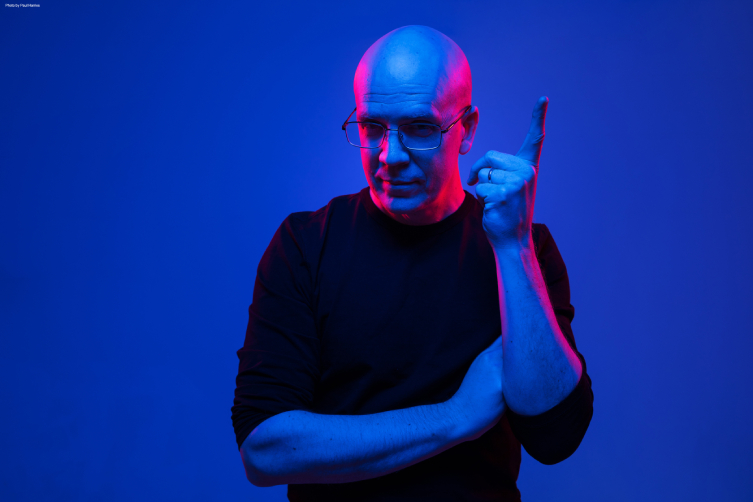
(Photo: Paul Harries)
The production aspect of the work was one of the remaining bastions of things that I wanted to attempt to see if it would work for me. You know, I did the same thing to that that I did to Strapping and DTP, so now I have set myself up in a way way that I’m really psyched on for my future work. I’ve created an autonomous creative hub of subcontractors that I can say ‘Let’s try this, let’s try this, you do this, you do this’ and at the end, I can have complete control over it and I can then decide - on my own - whether or not it’s in line with the emotional authenticity that was required for me to stomach it, let alone put it out!
GG: Yeah! See that exact feeling you got with Strapping and DTP: does it creep on you or is it like a sudden aversion? Being really, really flippant, do you ever get that way where you’re really into your Les Paul and then all of a sudden, without anything happening, it’s really shit and you have to reach for your Strat?
DT: It’s not like that, the problems persist from the beginning but I’m fairly idealistic in thinking that they’ll sort themselves out.
GG: Right.
DT: And then when I hit something - it can be a certain event, it can be a thing that’s said or whatever - and I’m like ‘Ah, that’s never gonna change’. It could be like rushing the fills. Eventually the drummer will stop rushing the fills, or whatever, and it’s like ‘he’s never gonna fucking stop rushing the fills’ (laughs) and it drives me crazy.
So you can support and try to be a part of a team, and this is not idealistic either because there are a lot of scenarios in my life where the problems creatively exist from the get-go, but then through conversation and joint activities in which we surmount obstacles, those things smooth themselves out. Now, all of a sudden, you’ve got allies. I’ve got allies that I’ve had creatively in my life for 40 years because we work through these things and find compromise. It’s the same reason I’ve been married for so long! So, this isn’t an idealistic thing that I’m setting up as a self-perpetuating scenario where I can use it as an excuse when things go south. No, because it has happened throughout my career.
GG: Yeah.
DT: I’m working with somebody who’s not perfect but then we communicate, we refine it and then all of a sudden we’re fine, right? So a lot of times with bands, productions, whatever, I think the maybe we can just keep trying and eventually that will sort itself out, and that will sort itself out, and vice versa: they think that maybe I’ll sort out some of the things that are bothersome for them, too.
But at a certain point, maybe you just have an argument with somebody or there’s a certain amount of recidivism that happens with a personality trait: you know, twice is cool, three times, you know what I mean, but ten times is like, ‘this is always fuckin’ gonna be that way’, and I’m not getting younger so fuck this.
GG: Yeah, haha!
DT: That’s where the switch flips. It’s not like a borderline personality disorder where I’m fine and then I’m not. I’d say: ‘the way you interact with people when you’re tired is inappropriate for the team. Please work on that’. And over time, it just keeps happening, and keeps happening. Then all of a sudden, I’m like: ‘Okay, fuck it! Bye!’ You know? (laughs)
GG: As you say, life’s too short. Exactly!
DT: Yeah, and it’s also too short to assume that the decisions you need to make for your creative process, people will dislike you for, therefore you shouldn’t make them. If that’s the way you choose to move creatively, you’re gonna stay where you are. And if what it means for me to figure out however limited my peripheral vision on my own process is - which admittedly it is, otherwise it would be prior to the last month of a record where I’d know what the fuck it was about - but however it works out, man, that’s what it is.
And so, one decision that I’ve made over the past couple of years is: you need to - on your own side - structure your creative environment so that when these moments come where you choose to go in a different direction, you haven’t lead people on. Subcontractors everywhere.
"I think I wanted to be on a team so badly that I was creating these really dusfunctional democratic dictatorships"
So, going into relationships now, I go: ‘I have a bunch of things I want to attempt, creatively, because I think they could potentially be really cool, but they might not be. So, there’s a good chance that our interaction, creatively, is going to require huge amounts of effort and will yield nothing (laughs). As long as you’re paid, and you know that’s the case, then I’m cool to continue.’
But that’s something new that I learned as a result of things, right? I think I wanted to be on a team so badly that I was creating these really dysfunctional democratic dictatorships where I wanted complete control over the vision, yet I wanted to listen to everybody else’s ideas and then be dissatisfied with the result. You know?
GG: It’s tricky.
DT: But you gotta learn man, and I’m committed to the process of learning, so.
GG: For sure! These are fantastic answers, Dev. Thank you for being so verbose about it. Now, I only had a few other things I wanted to ask you, I hope I’m not keeping you too long?
DT: It’s all good, man.
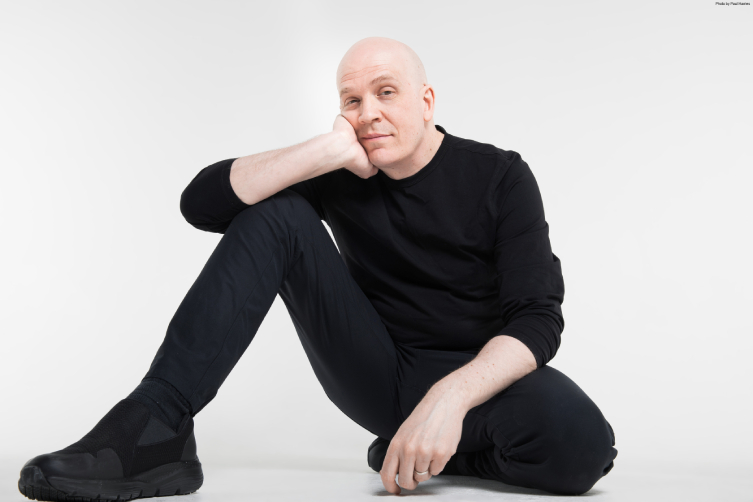
(Photo: Paul Harries)
Mental Health on the Road
GG: One of them’s just a geeky guitar question since why not? We’re guitar players! But before that, the other thing I did want to come back to from earlier on is what I have here in my notes as ‘sanity’. It’s about how much I know you need to have access to nature, trees and water every so often in order to recharge and stay mentally ok. Now, you’ve just finished seven weeks of touring: have you been able to get all that? And what else do you do to keep sane on the road?
DT: Meditation, first thing in the morning, last thing at night.
GG: Is that like TM (Transcendental Meditation) or something?
DT: No, you know, there’s a million different types of meditation. These are ones I’ve studied for ten years or so, I don’t even know what it’s called! But it’s not just morning and night, it’s also before shows, or when I interact with somebody who’s an energy vampire, you know? Like, I think that as somebody who is sensitive to others, it’s on me - and anybody who feels the same ways as me - to proactively find ways to navigate that. Otherwise, you just end up being a sponge to people and then you’re a fucking wreck! And once again, it’s the martyr syndrome. It’s like ‘ah, I’m so distraught’! Well, fuckin’ protect yourself then! If you know that you’re susceptible to a certain type of energy, a certain type of people, or certain type of environment, then avoid it!
And if you can’t, find ways to mitigate its effects. Like, I never go to shows. The only thing I ask for from our Tour Manager is: when we have a hotel room, I’d like a bath tub, you know? (laughs) I like having a bath, it really helps! But I’ve also been doing this for so long that, as sensitive as I am, I’m also very resilient, and I think that part of that resiliency comes from saying, around the turn of the century: ‘You need to find ways and techniques to navigate this or it’s gonna eat you alive’. That’s when I started looking into meditation, and looking into things that were more self-help.
You know, I think what’s really interesting is that so much of what we fall into, in terms of this scene, in terms of this current state of evolution, is that there’s such established gender roles. I remember seeing a comedian railing on men who choose to have baths, as if it was indicative of some sort of weakness (laughs). I remember thinking, ‘That elicits macho posturing?’ Not wanting to be in some warm water? Fuckin’ absurd, dude! It’s absurd! So, a lot of the ‘Argh, men don’t do that!’ stuff, or, ‘that’s not heavy metal!’, I’m like, ‘I don’t give a fuck, dude!’ (laughs) I think ‘not giving a fuck’ is item number one on the checklist of being able to do this, right?
GG: Yeah, it most certainly is, haha! This was been such a good conversation, and my last few questions are just gear chat. It feels like a let down to you!
DT: Not at all man, I love gear!
What Gear Does Devin Townsend Use?
GG: Haha, okay! I mean, there are things I want to know and I’m sure the guitarguitar people do as well. Your tones are always excellent, and because you use the Axe-FX, what I don’t know is which particular amps and maybe even guitars you use to create your models?
DT: It migrates as the operating systems change. The Axe-FX, over the past maybe ten iterations of their operating systems, have stopped this thing that I found very irritating, where I found that every time I upgraded my operating system, the character of the amplifiers would be subtly altered. So, that’s no longer the case, and since then, I’m not tied to what amplifier it is, but I use the (Diezel) Herbert for my heavy sound. But a lot of what it is that I do to find the spot in the mix for my guitar is I do a high pass, all the way up to 100, basically. So, a lot of that low end is just strategically where the bass lives, and because I’ve got so much information going on with bass synths and tubas and things like this, that real estate becomes more and more limited. I do a lot of really tight frequency…I don’t know what the term would be, where you’re kinda putting it behind bars to a certain extent.
GG: I’m with you!
DT: So, I use a Herbert. I’ve made my own IR - actually, I made it with Garth - for the Axe-FX and we released that on Fractal’s website a couple of months back.
For clean, I sort of migrate through a few, because the sort of clean sound I was always in pursuit of was a vintage Telecaster, middle position, really old 1958 Fender Twin, maybe put the Maxon CP101 in front of it, because it has such a fast transient as a compressor, so it sounds like the tubes are warm.
I love the sound of a big clean sound that is dynamically such that when you dig in, you get more aggression. But, that’s also such an idiosyncratic sound. Having that play ball with different gain stages, with one guitar, you have to have compromises, right? Like, in the studio you can for sure go between a few things, but the way that I manage to find solutions to that is, I’ve worked with a couple of guitar companies and pickup companies, that I was able to design the voices with the products so that they would give me a good medium between all of those things. You’re not going to be able to find those exact tones with one guitar. Trying to find that EMG 81 vibe, whilst also finding the middle position of a 1950s Telecaster is like…you can get close, but it’s absurd to think you can get exactly that, at least at this stage of technology.
So, I worked with Fishman and made a pickup called the Transcendence pickup. In order to sort of bridge that gap, it’s got a blade but it’s also got pole positions, and the ‘pull’ to get to the second tone was one that we were able to sculpt autonomously from the heavy tone. It’s basically like a low gain single coil that has a preamp, post. So, I’m able to get the volume to the point where it can play ball with the humbucker. The humbucker sound is similar to an 81, but in order to achieve what I needed to achieve for the clean sound, it’s a little more passive sounding than I would’ve gone for, but you end up incorporating that into your work and now it’s like a part of the sound, in a sense.
GG: Mm, it’s a cruel, bleak world in which we have cannot have a guitar that has an EMG 81 sound at the bridge and a telecaster at the neck! Im always raging that my Les Paul doesn’t immediately sound like a Strat in the neck positon, but I think you probably have gotten as close as it’s possible to get at the moment!
DT: To the capacity that both Fishman and I was able, that’s what the goal of the Transcendence pickup was.
What Guitar Does Devin Townsend Use?
And then with the guitars, it’s Framus and now Keisel and the idea was to…for me, another cruel thing is the construction of those two guitars are worlds apart. You’ve got, like, heavy mahogany set neck, 24.75”, maple cap, you now? Then you’ve got bolt-on, alder, ash, 100 year old, fuckin’ weighs 3 lbs, no pitch to the headstock, maple fretboard. They are fundamentally different. So, what I did with the Stormbender guitar was, I had to make some executive decisions on what gets most played for the work. What comes up at almost 85% of the workload is the heavy sound. We made the Stormbender 25.5” because it was down to Open C. I’m always in Open C, I have 10-52 strings no matter what tuning I play because I’m used to the tension, so having the Framus 25.5” allows that to be slinky enough. When it was 24.75”, it was like rubber bands.
And then I love the sound of a set neck and I love the feel of a through-neck, so we made the Stormbender a set but made it feel like a through, but we also put the pitch of the headstock and the thickness of the body such that I can lay it on the ground and the headstock has clearance, unlike on a Les Paul where it does that thing and then you break the headstock every few months! But it’s a mahogany body, maple top, ebony fretboard, so it’s basically a Les Paul Custom, but it’s a different shape because I always felt like, for me, it looked really stupid on me to play a Les Paul!
GG: It didn’t! You looked good, but never mind! See on the Stormbenders: I’ve never had one in my hand, and one of the fundamental differences of a Les Paul, to me as a player, is the fact that (I wave my hands around trying to explain my point) it’s almost like the guitar comes around you a little because of the pitch of the bridge, so the whole neck is slanted back already, as opposed to a Fender, which is straight across. Is your Stormbender like that?
DT: Because I use the Evertune - and swear by it - not as much as a Les Paul. I think that’s actually really interesting, I’d never identified that that’s a lot of what makes the Les Paul feel the way that it does. That’s really interesting! So, no, it doesn’t have that. It that sense, it’s much more like a Strat.
But again, I think that. As I work with guitar companies, solving problems, I think people who have not had the opportunity to design a guitar think, ‘Oh, if I had…’, ‘if I were principle of the school, I’d have coca cola in all the water fountains!’ (laughs), it’s like, some things you just can’t do! If you don’t have the guitar to lie down on the ground and create that gap with the pitch of the headstock that makes it really sketchy if you’re a clumsy fuck like I am, then, you’ve got some decisions that you have to make!
How I choose to work with companies, whether it’s pedal companies, guitar companies, pickup companies, whatever, is I’m basically like: where are the parameters that we work within? And how far can we go? Within parameters, and a lot of times it’s like, you can’t go outside of here, and you can’t go outside of here. Okay, cool, we’ll work within that.
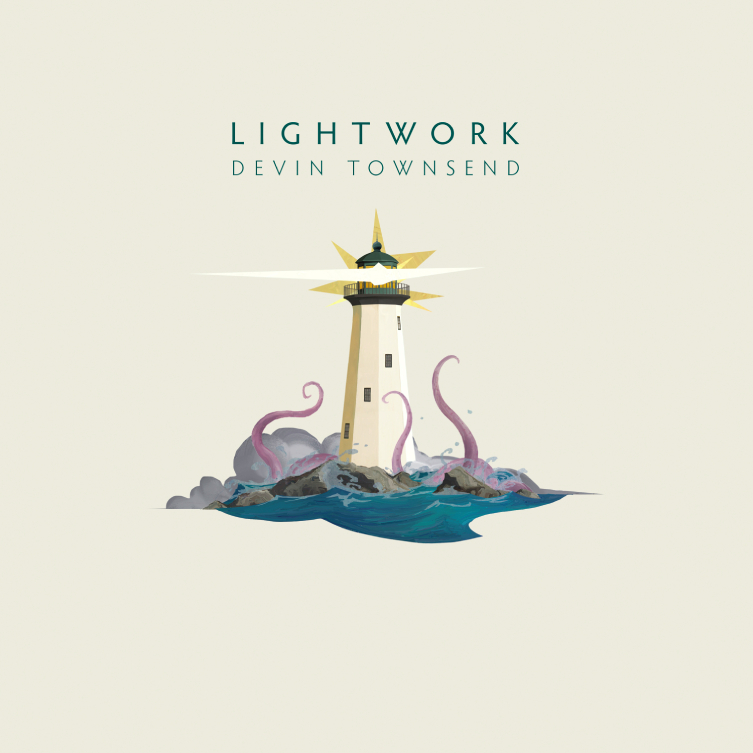
At this point, Devin and I discussed a few things that, at this point, we can’t really talk much about. Suffice to say, fans of his - and guitar aficionados in general - will love what’s just on the horizon! As always, it was wonderful to talk with Dev, and we thank him for not only giving up part of his afternoon but also for sharing so much detail and insight with us. It’s a privilege as much as it is fascinating.
Keep up with Dev on his official Hevydevy website, and click back through over 150 exclusive interviews over at the guitarguitar interviews page.
Thanks for reading and we’ll see you next time!


